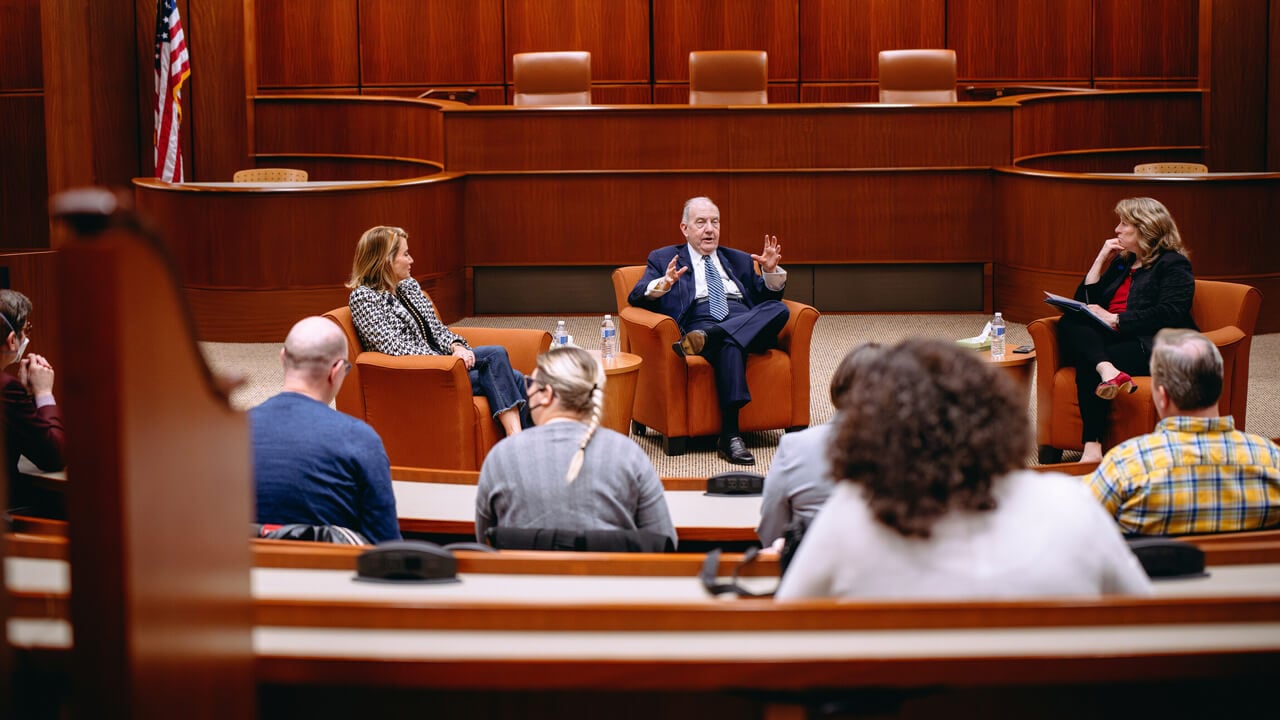
State legislators share critical conversation on opposing parties working across the aisle
April 08, 2024

April 08, 2024

Quinnipiac School of Law Dean Jennifer Brown facilitated an engaging chat between the two notable state legislators on March 28. Among Quinnipiac community members and others comprising the audience in the law school’s Brooke A. Goff Courtroom, Brown recognized and thanked President Judy Olian and Provost Debra J. Liebowitz for their support.
“I think the presence of these leaders signals the importance that Quinnipiac is placing on these conversations about civil discourse and problem-solving across difference,” Brown said. “And tonight, we have two experts on those topics.”
Klarides, an attorney, was first elected as a Republican member of Connecticut’s House of Representative in 1998. She became the first woman to lead state Republican representatives as House Minority Leader (2015 through 2021), during which time Klarides was also the highest-ranking woman in the state legislature.
Looney, also an attorney, has served as a Connecticut Democratic state senator since 1993. Looney was Senate Majority Leader from 2003 to 2014 and, in 2015, became President Pro Tempore. As a part-time Quinnipiac instructor, Looney has impacted students with courses he’s taught at both the School of Law and the College of Arts and Sciences.
For the law school students, faculty and alumni in the audience, Brown asked Klarides and Looney whether politicians who are also lawyers may play a special role in combating discord and creating consensus as legislators.
“I think the role of lawyers is critical, because it’s one of the few areas where you may have common ground,” said Looney. “You can have lawyers who are members of both parties [and thus have policy disagreements], but in their legal practices, they may have had similar experiences and recognize certain problems in the law that need to be addressed in terms of equity, fairness and process.”
Additionally, the legislature benefits from attorneys who bring professional experience and knowledge of the law to their legislative work, said Looney.
As legislative leadership representing differing political parties, Looney and Klarides often strongly supported opposing positions as lawmakers. Brown asked how they worked to bridge divides and move the legislative process forward.
“You have to be very strong and hammer home your position, but then you have to listen to the other side,” said Klarides. “With any job you have, you need to be listening to the other person and trying to figure out how are we going to come to some kind of understanding. And it may be that you agree to disagree, which is okay. But that seems to be happening less and less these days because there is such extreme polarization.”
Looney said one remedy to address polarization and move differing positions toward compromise begins with opposing sides coming together in good faith and the intent to explore ways to come to an agreement.
“They have to begin with the principle of goodwill and to say they are going to sit down with the premise that they hope to come to an agreement,” said Looney.
Klarides said those who have a passion for wanting to help and make things better can break through polarization by becoming involved locally or at other levels.
“You can be the person that makes that difference,” said Klarides. “If you have that feeling, you should get involved, at whatever level and see what’s available. Because that’s the only way change is made. Otherwise, we give up. If we give up, only bad things happen.”
Quinnipiac’s Critical Conversations Speaker Series invites notable speakers from across a spectrum of expertise and experiences, seeks to cultivate an inclusive and intellectually stimulating environment at Quinnipiac, fostering inclusivity of thought, respectful dialogue, empathic engagement and open-mindedness among students, faculty and staff.
Quinnipiac Today is your source for what's happening throughout #BobcatNation. Sign up for our weekly email newsletter to be among the first to know about news, events and members of our Bobcat family who are making a positive difference in our world.
Sign Up Now